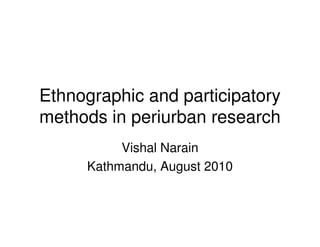
Ethnographic and participatory methods in periurban research_Dr. Vishal Narain
- 1. Ethnographic and participatory methods in periurban research Vishal Narain Kathmandu, August 2010
- 2. Qualitative research vs quantitative research • Difference in assumptions about social science – Positivism vs interpretivism • Nature of research questions – How and why questions, process-based rather than how much questions • Nature of data analysed – Events, anecdotes, relationships, processes, and evidence as against numbers • Approach to data collection – More open-ended, unstructured
- 3. Characteristics of qualitative research/ reports • Rich contextual detail • Data in the form of words, sentences, expressions, photos, videotapes • Researcher’s personality plays a role • Require improvisation • Need good writing skills
- 4. The qualitative research orientation • A non-positivist perspective – Interpretive and critical approaches to social science • Circular path – Not necessarily linear, or one step after the other
- 5. Qualitative Research: some basic principles and concepts • Ethnography – Description of people • Grounded theory – Immerse in data to theorize; say something about the phenomena that we see – Data and theory interact – Inductive vs deductive method • Case study research – Look for patterns – Develop and refine concepts – Immersion in the data – Domain of generalization • Analytic generalization as against statistical generalization in quantitative research • E.g, each of our villages can be a case study that we use to illustrate or generalize on certain relationships
- 6. Qualitative Techniques.. Ctd. • Focus Groups • PRAs, RRAs • Semi-structured interviews • Action Research • Process Documentation Research
- 7. Doing qualitative research • Studying process, sequence and time • Levels of interpretation – Different levels of coding • Quotations • Thick descriptions – Detailed account of a specific activity • Photographs • Build on anecdotes and experiences: they are part of evidence
- 8. Ethnographic methods • What is ethnography ? • When do researchers do it ? • Why is it carried out ? • What does it entail ?
- 9. What is ethnography ? • Ethnos + Graphein • Anthropology (anthropos + logos) • Entails fieldwork – Long period of observation – Direct interaction – An iterative, semi-structured approach – “Playing by the ear” – Keeping eyes and ears open
- 10. When is it suited ? • Answer “how” questions ? • Study of – Social movements – Occupations – Social interactions and processes – Deviant behavior
- 11. Principles of field work • Methodological pragmatism • Naturalism • Socialization • Researcher’s personality plays a role
- 12. Steps in field work • Start with a research question • Defocus • Select a site • Dealing with gate-keepers • The access ladder • Disclosure • Listen, see and observe • Regular field notes – Building blocks of field work – Analysis starts while in the field
- 13. Dealing with key informants • Who is an informant ? • The informant interview – Context is important – Semi-structured • What makes a good informant ? – Familiarity with the site – Currently engaged – Some one who can give time
- 14. Sampling in field work • Theoretical sampling – Sample on the basis of theoretical relevance, or the ability of the specific case to say something about the issue being researched • Snowball sampling – Follow leads from one to another • Sample – People – Locations – Timing
- 15. Intricacies of field work • Dealing with freeze-outs • Ethical issues – Extent of disclosure – Intrusion – Confidentiality – Dealing with deviants • Managing stress – Physical – Mental • When does field work end? When can you exit ? – When theory building ceases – Just call it a day ?
- 16. Participatory Rural Appraisal • A method of enabling communities to share information about themselves using visual techniques and discussions • Evolved from – Disenchantment with questionnaire surveys • High costs • Errors • Delays • Manipulation
- 17. Principles of PRA • A paradigm shift in the social sciences • Question of attitude • Direct learning from the local people • ‘Handing over the stick’ • Plurality of methods • Optimal ignorance • Information shared and owned by local people, as against being extracted by outsiders
- 18. Some PRA tools • Village transects • Village maps • Venn Diagrams • Seasonality Calendar • Wealth-ranking • Time line • Trend analysis • Focus groups • Semi-structured interviews • Do-it-yourself exercises
- 19. Modes of analysis • Done by local people, in groups • Visual • Comparisons • Interactive • Iterative
- 20. Applications of PRAs • Natural Resource Management • Village Development Plans • Programmes for women and the poor • Agriculture and food security • Used by NGOs, students and universities – MYRADA, Action Aid, AKRSP in India promoted it extensively
- 21. Some benefits of PRAs • Rapport building • Create an atmosphere of shared learning • Often more cost-effective and quicker than questionnaires • Present “aggregate picture” • Fun, interest
- 22. Some practical points about PRAs • How long ? – Depends on time and resources – Not done hurriedly – Ten days- four weeks • Who does it ? – Inter-disciplinary teams – Groups of people • Consistency checks – Triangulation
- 23. Practical points • Sequencing – No rigid sequence – Start with maps, graphs and move to sensitive subjects
- 24. Dangers of PRA: how not to do a PRA • Who participates in these exercises ? • ‘Instant fashion’ • Often Hurriedly done to impress donors and get funding • Pitfalls of ‘rural tourism’ • Formalism: emphasis on manuals and procedures • Routinisation: loss of spontaneity